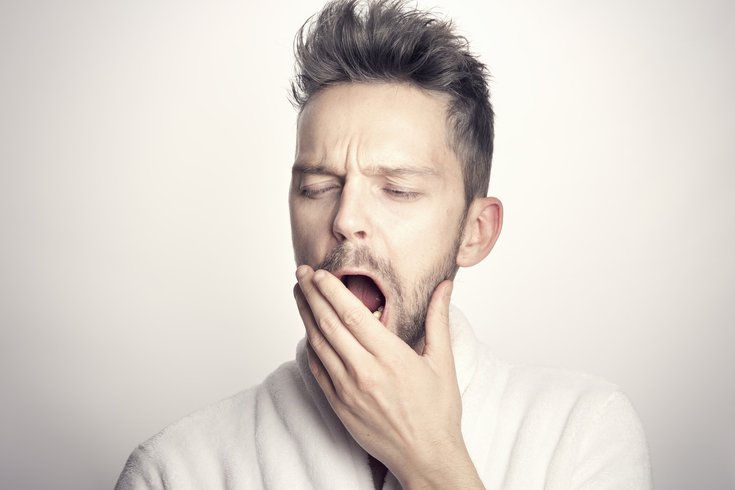
September 08, 2021
 Sammy-Williams/Pixabay
Sammy-Williams/Pixabay
Sleep debt is the difference between how much sleep your body needs and how much you are actually getting. As much as 40% of working adults sleep less than six hours a night, the U.S. Centers for Disease Control and Prevention reports.
As people return to work and school from summer vacations, those early morning wake-ups can be particularly challenging.
People who find themselves burning the candle on both ends most days and getting fewer than the recommended 7-8 hours a sleep each night, are probably accumulating sleep debt.
Sleep debt is the difference between how much sleep the body needs and how much a person actually is getting. As much as 40% of working adults sleep less than six hours a night, the U.S. Centers for Disease Control and Prevention reports.
Lack of sleep can add up pretty quickly. Just one less hour of sleep Monday through Friday results in a sleep debt of five hours by the weekend. The longer people go without their optimum amounts of sleep, the worse the symptoms of sleep deprivation.
Pulling an all-nighter is the equivalent of having a blood-alcohol concentration of 0.10%, according to the CDC. This is higher than the limit to legally drive.
After 24 hours without sleep, people will most likely feel drowsy, irritable, angry and stressed. They may also be more accident-prone and have trouble concentrating.
The longer people go without sleep, the more intense the symptoms they experience. At 48 hours without sleep, they many even begin to hallucinate, Healthline reports.
While most people don't stay awake for days in a row, even just losing an hour or two each night can add up. According to sleep.org, when people are sleep deprived, not only is their alertness affected but also their abilities to learn and recall important pieces of information. It also can affect creativity and play havoc with the immune system.
Additionally, studies have shown that poor sleep habits can lead to consuming more high-calorie foods and eating later in the day, which raises the risk of obesity, diabetes and heart disease.
It is possible to recover from sleep deprivation, but it can take some time. A quick nap or sleeping in on the weekend can ease symptoms, but people need multiple nights or even weeks of good sleep to fully catch up.
Some studies have shown that sleeping in on the weekend can improve insulin sensitivity, fat metabolism, body weight, stress levels, fatigue and performance. One study found it even eliminated the risk of early death. Most sleep experts, however, say that it's better to go to bed earlier than it is to sleep in late.
One study found that it took an average of four days for people to recover from just one hour of sleep debt. Overall, the more sleep debt people have accumulated, the longer it takes to recover. Another study found that teenagers needed about two weeks into their school holiday to cancel out sleep debt.
Sleep experts say for optimum sleep health, people need to stick to a consistent sleep schedule, waking up and going to be bed as close to the same time each day as possible. Even on the weekends.
When people sleep in or stay up later, the disruption to the circadian rhythm can make it difficult to return to a regular sleep schedule during the week.
Napping appears to offer better results when it comes to catching up on sleep; however, not everyone can easily fall asleep in the middle of the day. If people can sneak one in though, a quick 10-30 minute nap appears to provide the most benefit. It can improve short-term attention, sleepiness and job performance, and it also can strengthen the immune system and reduce stress.
Healthline and the Sleep Foundation offer some tips on how to improve sleep health:
1. Prioritize sleep. While there are certain situations – a big work deadline, a sick child – in which lack of sleep is unavoidable, you should try to prioritize a good night's sleep as much as possible. Don't let binging that new Netflix series or finishing that book prevent you from getting enough ZZZs.
2. Develop a nightly routine, whether it is to take a bath and enjoy a cup of tea or relax in bed with a book before turning the lights out. At least 30 minutes before bedtime, shut off the lights and turn off all electronics to signal to your body that it is time for sleep.
3. Try to eliminate any daytime habits that might be affecting your sleep, like caffeine late in the day or not getting enough exercise. Rich or spicy foods right before bedtime also can make it difficult to fall asleep. Another good habit is keeping the bed for just sleep and sex, and not for working or watching television.
4. Be sure to spend enough time outdoors in natural light every day to help regulate your body's internal clock.
5. Adjust your bedroom for optimum sleep by setting the thermostat at a comfortable temperature and blocking out any lights or noises that might disrupt your sleep. If you are tossing and turning almost every night, consider replacing your mattress and pillow.
6. If you aren't sure what of your optimum amount of sleep, increase your sleep time by 15-30 minutes at a time until you feel the most rested. A sleep diary can help you track your sleep patterns.
If you are still not getting quality sleep with a consistent sleep schedule, you might have an undiagnosed sleep disorder. Talk to your doctor about scheduling an evaluation.